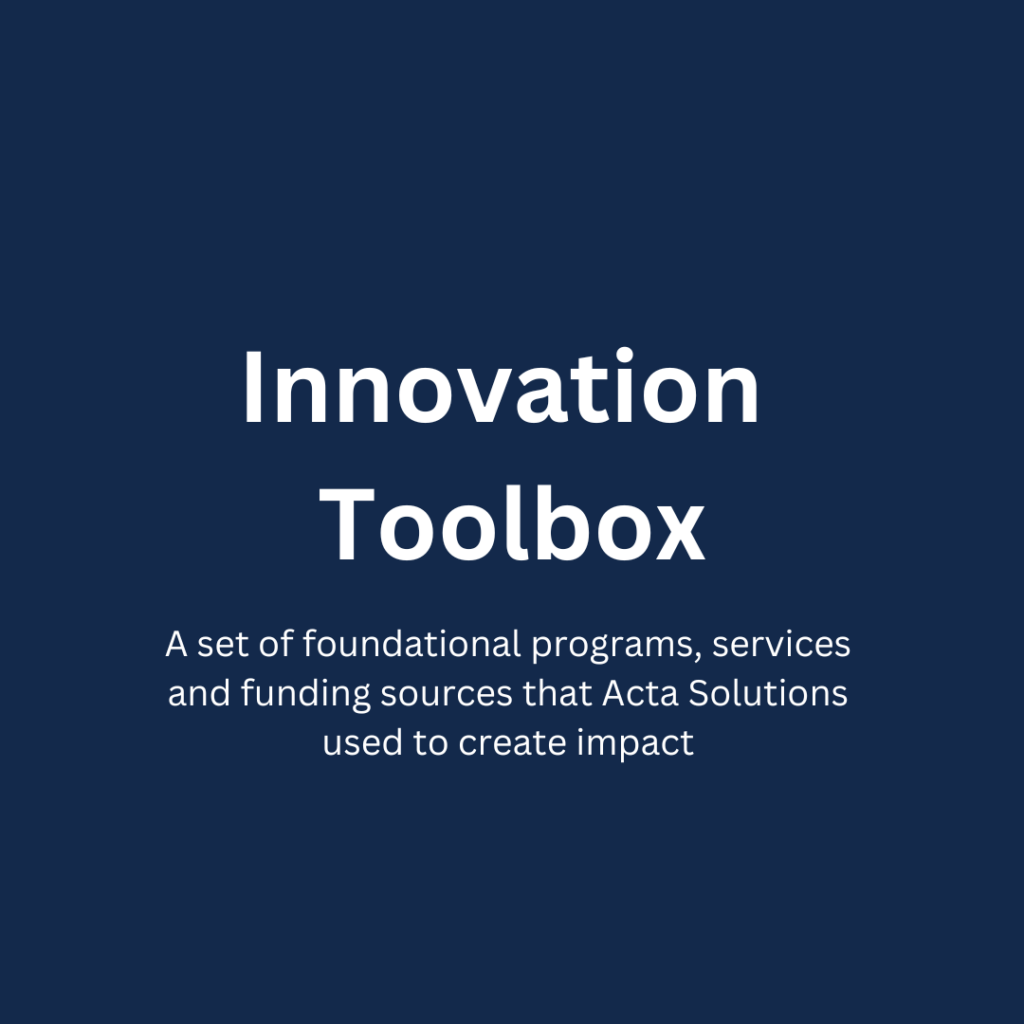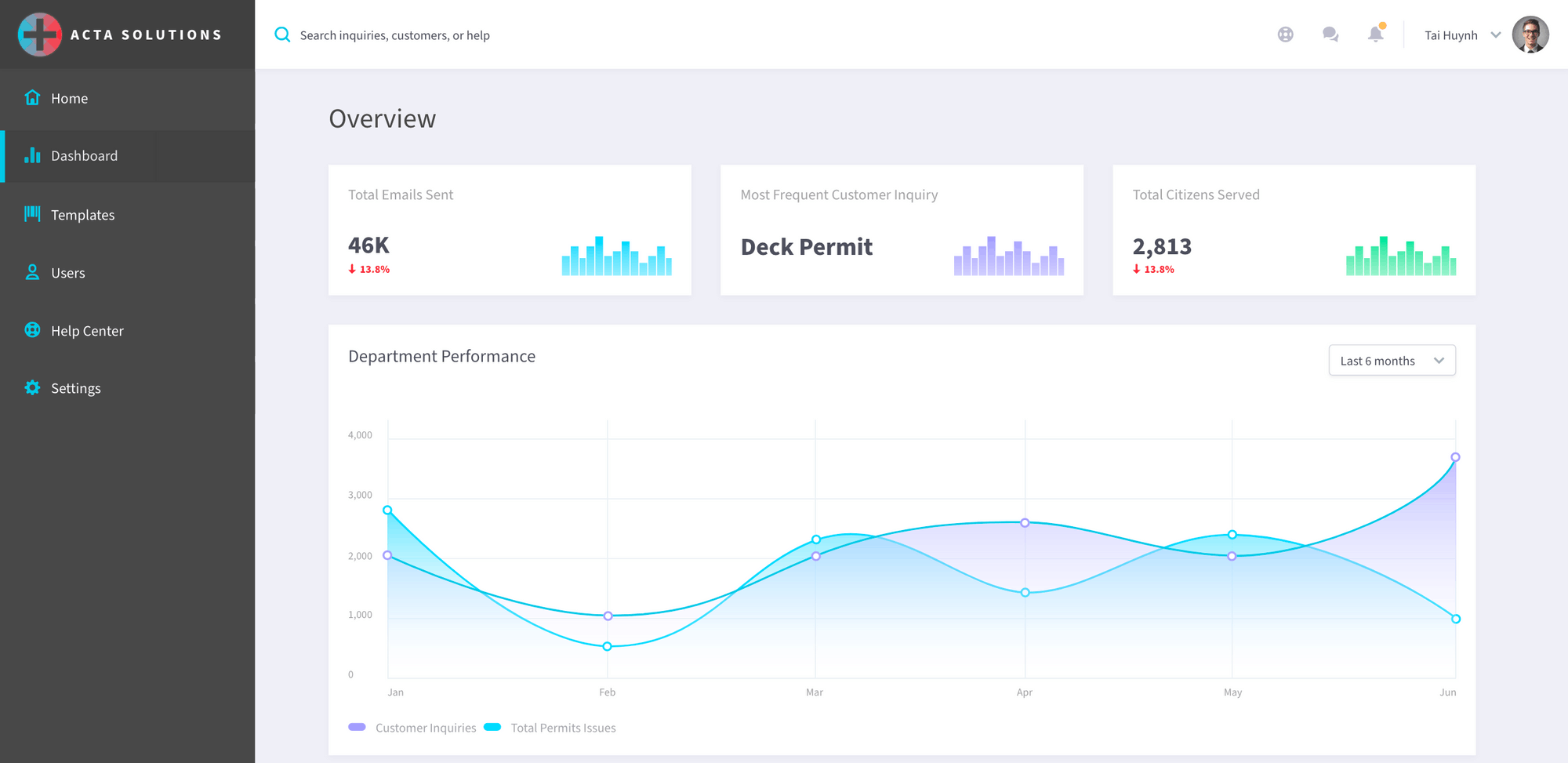

Acta Solutions, a gov-tech startup with roots at UNC-Chapel Hill, helps local governments across the U.S. save major time and money—and be more responsive to citizens—answering mountains of calls and emails from people in the community. What mix of funding, services and expertise did this fast-growing venture use to sustain itself during uncertainty and build coast-to-coast customer traction?

You might guess that the biggest bet CEO and co-founder Tai Huynh ever made was starting his company Acta Solutions. But it was an unconventional wager he placed in high school—well before he launched a startup during his student days at UNC-Chapel Hill—that he points to as his entrepreneurial cornerstone. His bet? That he could succeed as a real-estate agent.
After working a minimum-wage job at McDonald’s for two years trying to earn money for college, Huynh landed a new gig during his final year in high school that excited him. It soon presented a conundrum, though. “I got a job as an afterschool teacher working with kindergartners, which was a dream come true because I was making the most money I’d ever seen—ten dollars per hour—doing something I loved,” he said. But when someone offered to pay for him to earn his real-estate license, he faced a decision. “I arrived at this impasse: would I stick with this cushy job that I enjoyed, or take a risk on myself and see if I could become a real-estate agent? I knew I could make a lot more money, but it would depend on my ability to sell houses.”
Huynh chose the risky route—and thrived. “I sold two houses and made more money than I had during my entire four years of high school,” he said. “It was a ton of work, but taking that risk, betting on myself and building that muscle of believing in what I could do made it easier to decide to launch my own company in college. I’d taken the risk before.”
Buoyed by early entrepreneurial confidence, Huynh co-founded Acta Solutions, a gov-tech startup that helps local governments provide better customer service, with fellow Carolina students Pavani Peri and Andrew McKinnon in 2020. The company’s software-as-a-service (SAAS) solution works inside email inboxes, making it easier for government employees to respond to repetitive and time-intensive requests like reviewing and responding to citizen requests for permits, inspections and licenses.
“Every day, local governments get bombarded with calls and emails, and they’re juggling thousands of tasks for processing permit applications and performing inspections on top of all their other work,” Huynh said. “We help government departments save of hundreds of staff hours each month that they can reallocate to higher priorities.”

Acta, whose technology is used by 28 local governments in nine U.S. states—Raleigh, NC; Tampa, FL; Grand Rapids, MI; Maricopa County, AZ; and Sutter County, CA to name a few—has made a quick impact: helping clients save more than 30,000 staff hours and serve over 8 million citizens since 2020.
The software that Acta provides today isn’t its original version. Landing on the right offering required navigating pandemic-driven market changes, technical reworks and a deeper understanding of customer demand. Huynh, Peri and McKinnon first developed a product that used artificial intelligence to help local governments analyze community feedback. “We were building a platform that could take in all the open-ended, free-form feedback that governments receive, make sense of it, and provide insights on what citizens in their communities actually wanted,” explained Huynh. But as the trio graduated in 2020 during the COVID-19 pandemic, they hit a roadblock.
“The biggest problem we ran into with our first product was that we had a ton of people tell us they wanted it, and so we were confident that there was a market,” Huynh said. “But as soon as the pandemic hit, we quickly learned that all of those data points represented wants, not needs. The problem we solved was no longer high on their pain rankings.”


The team spent nine months trying to pivot its product into new non-governmental markets—pharmaceutical research and corporate consumer insights, for example.
Yet, with only two or three months of financial runway left, Huynh, Peri and McKinnon concluded that the first product simply wasn’t built for other verticals. They decided to return to their government roots and redo customer discovery.
“We did customer discovery a lot better and uncovered a new pain point in the local government vertical,” explained Huynh. “With the pandemic, every single country and city hall shut down and had to digitize the process of accepting applications. Everything that used to happen as quick face-to-face conversations with citizens quickly translated into thousands of emails and calls, and these government offices weren’t structured to handle that volume of requests. Uncovering that pain point was the pivotal moment that has led us down the path to where we are today.”
As students, the Acta founders didn’t have personal resources to fund the company, so they turned to University-based and regional resources. “As students, we were all broke, so the funding was mainly from grants, pitch competitions and the Launch Chapel Hill student accelerator, which came with a $2,500 stipend for the summer,” Huynh said. “By the time we finished at Carolina, we took advantage of practically every entrepreneurial resource available—from the Dreamers-Who-Do Award to the 1789 Student Venture Fund.”
Those early bits of University funding added up, Hyunh said, as did other resources, such as angel investments and regional grants. Raising funds without sacrificing equity was a priority from the beginning. “We threw everything at the wall to see what stuck,” Huynh says of the team’s early approach to funding. “But we were strategic in being adamant that we only wanted non-dilutive funding.”

Bootstrapping the business for an extended period without giving up equity required arranging up-front payments from early customers. “We saw that the government would pay us up front, so we were confident that once we got the ball rolling, we’d have enough capital and cash flow to continue growing the business. It was a matter of being frugal until we got to that point.”
Huynh says the NC IDEA MICRO grant and NC IDEA SEED grant—along with pandemic-related funds from the North Carolina Small Business Impact Grant program (RETOOLNC)—sustained Acta Solutions during its most frugal periods, giving the company time to ramp up revenue. Huynh recommends letting business drive grants rather than grants driving the business. “We focused on building the business, and once we got traction, that helped focus our answers to grant applications, which led to successful submissions,” said Huynh. “The less time you’re spending on the grant applications and the more time you’re focusing on building your business, the better the result will be for grant applications.”
When Huynh, Peri and McKinnon graduated, “we lived together two and a half years after college as we built the startup, and our office was our living room,” he said. Living together as roommates built trust among the co-founders, a key to the company’s success.
As the team grew over the next two years, it moved into a physical space, American Underground in Durham. “We expected that we’d have to find a physical location once we were hiring folks, and we moved into our first space when we brought on our initial round of interns.”
Having three cofounders—Huynh as CEO, Peri as chief operating officer and McKinnon as chief technology officer—has been an ideal arrangement in terms of interpersonal dynamics and professional acumen, Huynh said. “Even though we’ve never really had a conflict, there’s a tie-breaker.”
While Huynh said that the Acta team is “lucky that the three of us have complementary skills,” the group doesn’t buy in to the “the old thinking” of having one co-founder solely focused on technology and another focused only on business. “All co-founders need to have a business mindset,” he said, noting that the company’s technical lead McKinnon has done cold calls. “All three of us do sales.”
In terms of hiring for Acta’s expanding business, the recommendations of mentor and entrepreneur Anil Chawla, founder of ArchiveSocial and a seed investor and advisory board member to Acta Solutions, proved vital. As the business grew, the team thought it should hire outside technical talent to further develop the product. “Anil helped us test those assumptions,” Huynh said. “He asked us, ‘You’re able to sell what you currently have, right?’ and ‘How much more do you need to build the product until you can sell it repeatedly?’ So, he helped us prioritize our hiring plan toward more sales people.”

From entrepreneurship courses to co-curricular programs, Huynh said his Carolina experience helped prepare him to become an entrepreneur. For instance, he connected with founders through the Adams Apprenticeship program whom he still turns to—along with mentors like Chawla— for ideas and advice. The type of advice he seeks has evolved over time, he noted. “In the beginning, our learning focused on sales: how to build a sales engine, sell effectively, create a repeatable sales process, and do cold outreach. Now, I focus more on learning to build and manage a team: how to hire, recruit and retain talent, build internal processes that set people up for success, and onboard employees successfully.”
He also remembers the Launch Chapel Hill summer cohort, which the three co-founders participated in between their junior and senior years, as among the most formative experiences.
“Launch Chapel Hill was the first opportunity that Pavani, Andrew and I had to work together fulltime on the business outside of class,” Huynh said. “We learned how to work together and where each of us had strengths. More than anything, Launch Chapel Hill gave us confidence that we could do it together and that there was nothing that the three of us together couldn’t solve. It built confidence among us as co-founders, which is the foundation of the business to this day.”